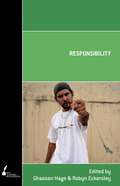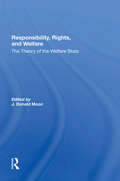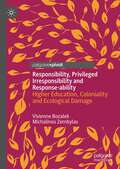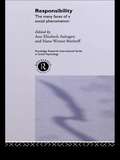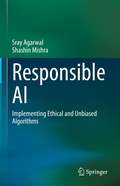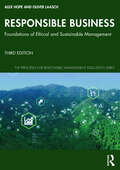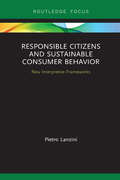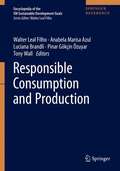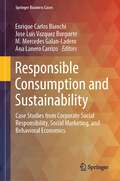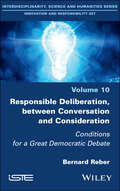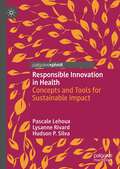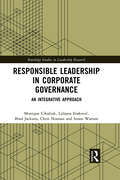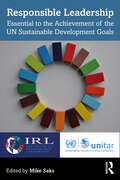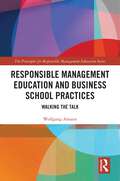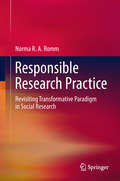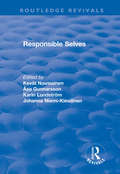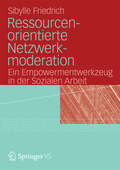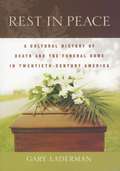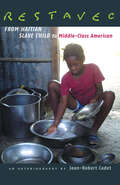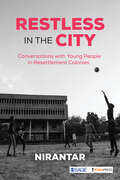- Table View
- List View
Responsibility
by Robyn Eckersley Ghassan HageThe concept of responsibility permeates social life. While it has many meanings, they often centre around questions of practical and moral accountability, culpability and liability. One can learn a great deal about a social formation by looking at the way the meanings of responsibility are deployed within it, the way they vary from one social space to another, and the way they are often at the centre of a political struggle over how we define and apportion blame. The essays in this book do more than examine such processes. Each in its own way also invites the reader to push existing assumptions about what individual, political, ecological and corporate responsibility entails.
Responsibility, Rights, And Welfare: The Theory Of The Welfare State
by J Donald Moon J. Donald MoonThis book explores the social, historical, and philosophical bases of the welfare state. It examines the ways in which the welfare state gives expression to the deepest impulses and values of our way of life as it deals with the issues of poverty and social dislocation.
Responsibility, privileged irresponsibility and response-ability: Higher Education, Coloniality and Ecological Damage (Palgrave Critical University Studies)
by Michalinos Zembylas Vivienne BozalekThis book uses the overlapping approaches of political care ethics and feminist posthumanism as a lens to focus on the notions of privileged irresponsibility, responsibility and response-ability within the context of higher education and as it pertains to the issues of colonialism/decolonisation, pandemics and the climate crisis. The book will appeal to scholars in the field of higher education as well as to those in several other fields, such as ecology, gender studies, sociology, philosophy, and political science.
Responsibility: The Many Faces of a Social Phenomenon (Routledge Research International Series in Social Psychology #No.3)
by Hans-Werner Bierhoff Ann Elisabeth AuhagenFirst Published in 2004. Routledge is an imprint of Taylor & Francis, an informa company.
Responsible AI: Implementing Ethical and Unbiased Algorithms
by Sray Agarwal Shashin MishraThis book is written for software product teams that use AI to add intelligent models to their products or are planning to use it. As AI adoption grows, it is becoming important that all AI driven products can demonstrate they are not introducing any bias to the AI-based decisions they are making, as well as reducing any pre-existing bias or discrimination. The responsibility to ensure that the AI models are ethical and make responsible decisions does not lie with the data scientists alone. The product owners and the business analysts are as important in ensuring bias-free AI as the data scientists on the team. This book addresses the part that these roles play in building a fair, explainable and accountable model, along with ensuring model and data privacy. Each chapter covers the fundamentals for the topic and then goes deep into the subject matter – providing the details that enable the business analysts and the data scientists to implement these fundamentals. AI research is one of the most active and growing areas of computer science and statistics. This book includes an overview of the many techniques that draw from the research or are created by combining different research outputs. Some of the techniques from relevant and popular libraries are covered, but deliberately not drawn very heavily from as they are already well documented, and new research is likely to replace some of it.
Responsible Business: Foundations of Ethical and Sustainable Management (The Principles for Responsible Management Education Series)
by Oliver Laasch Alex HopeAs sustainable development becomes an increasingly important strategic issue for all organizations, there is a growing need for management and executive education to adapt to this new reality. This textbook provides a theoretically sound and highly relevant introduction to the topic of socially and environmentally responsible business. The authors take a “competence-based approach” to responsible management education. The book aims to go beyond the traditional domains of teaching and towards the facilitation of learning across key competences. Each chapter in this book has a section dedicated to exercises that cover five core competences – know, think, do, relate, be – to enable self-directed transformative learning.Drawing from the classic background theories such as corporate sustainability, business ethics, and corporate social responsibility, these concepts are applied to the most up-to-date practices. The book covers an international perspective, featuring cases from countries all around the world, has a strong theoretical basis, and fully integrates the topics of sustainability, responsibility, and ethics. The book includes a wide variety of tools for change at individual, company, and systemic levels resulting in both an essential resource for business students at all levels and a self-study, practical handbook for executives.
Responsible Citizens and Sustainable Consumer Behavior: New Interpretive Frameworks (Routledge-SCORAI Studies in Sustainable Consumption)
by Pietro LanziniThere is broad consensus on the need to shift to a new paradigm of lifestyles and economic development, given the un-sustainability of current patterns. Given this, research on consumer behavior is to play a crucial role in shedding light on the motives underpinning the adoption of responsible behaviors. Stemming from a thorough discussion of existing approaches, this book argues that the perspective of analysis has to be modified. First, acknowledging that a profile of the responsible consumer does not exist since all of us can be more or less sustainable and environment-friendly: the sustainability of an individual should not be considered as given, being something dynamic that changes according to both subjective and contextual factors. Moreover, the book hypothesises that integrating dimensions and perspectives that have been so far overlooked by mainstream research will help deconstruct responsible behaviors adopting a flexible and holistic approach. Relevant policy implications are discussed, and empirical research on responsible behaviors is illustrated. This book will be of great interest to students and scholars of consumer behavior, sustainable consumption, environmental psychology and environmental studies in general.
Responsible Consumption and Production (Encyclopedia of the UN Sustainable Development Goals)
by Walter Leal Filho Tony Wall Luciana Brandli Anabela Marisa Azul Pinar Gökçin ÖzuyarThe problems related to the process of industrialisation such as biodiversity depletion, climate change and a worsening of health and living conditions, especially but not only in developing countries, intensify. Therefore, there is an increasing need to search for integrated solutions to make development more sustainable. The United Nations has acknowledged the problem and approved the “2030 Agenda for Sustainable Development”. On 1st January 2016, the 17 Sustainable Development Goals (SDGs) of the Agenda officially came into force. These goals cover the three dimensions of sustainable development: economic growth, social inclusion and environmental protection. The Encyclopedia of the UN Sustainable Development Goals comprehensively addresses the SDGs in an integrated way. It encompasses 17 volumes, each one devoted to one of the 17 SDGs. This volume addresses SDG 12, namely "Ensure sustainable consumption and production patterns" and contains the description of a range of terms, which allows a better understanding and fosters knowledge. Concretely, the defined targets are:Implement the 10-Year Framework of Programmes on Sustainable Consumption and Production Patterns, all countries taking action, with developed countries taking the lead, taking into account the development and capabilities of developing countriesAchieve the sustainable management and efficient use of natural resourcesHalve per capita global food waste at the retail and consumer levels and reduce food losses along production and supply chains, including post-harvest lossesAchieve the environmentally sound management of chemicals and all wastes throughout their life cycle, in accordance with agreed international frameworks, and significantly reduce their release to air, water and soil in order to minimize their adverse impacts on human health and the environmentSubstantially reduce waste generation through prevention, reduction, recycling and reuseEncourage companies, especially large and transnational companies, to adopt sustainable practices and to integrate sustainability information into their reporting cyclePromote public procurement practices that are sustainable, in accordance with national policies and priorities Ensure that people everywhere have the relevant information and awareness for sustainable development and lifestyles in harmony with nature Support developing countries to strengthen their scientific and technological capacity to move towards more sustainable patterns of consumption and productionDevelop and implement tools to monitor sustainable development impacts for sustainable tourism that creates jobs and promotes local culture and productsRationalize inefficient fossil-fuel subsidies that encourage wasteful consumption by removing market distortions, in accordance with national circumstances, including by restructuring taxation and phasing out those harmful subsidies, where they exist, to reflect their environmental impacts, taking fully into account the specific needs and conditions of developing countries and minimizing the possible adverse impacts on their development in a manner that protects the poor and the affected communitiesEditorial BoardMedani P. Bhandari, Luciana Londero Brandli, Morgane M. C. Fritz, Ulla A. Saari, Leonardo L. Sta Romana
Responsible Consumption and Sustainability: Case Studies from Corporate Social Responsibility, Social Marketing, and Behavioral Economics (Springer Business Cases)
by M. Mercedes Galan-Ladero Enrique Carlos Bianchi Jose Luis Vazquez Burguete Ana Lanero CarrizoThis book presents high-quality cases on the actions carried out by companies to minimize the social and environmental impact of the products (goods and services) they launch on the market. It also highlights the education campaigns that promote behavioral changes and new sustainable lifestyles that have been developed by all kinds of organizations (Public Administration, NGOs, and businesses), mainly from Corporate Social Responsibility, Social Marketing, and Behavioral Economics perspectives. International cases help students learn how management and corporate strategy, and the appropriate marketing strategies, can be designed with an aim to achieve responsible consumption and create sustainable lifestyles.
Responsible Deliberation, between Conversation and Consideration: Conditions for a Great Democratic Debate
by Bernard ReberCommunication is a crucial issue in our complex societies tinted by distrust. It is the core of democratic life and almost all human and social actions. Therefore it is essential for communication to be responsible. But responsible communication cannot only be conceived as a deontological issue, framed by ethical compliance requirements or good practices promotion. It should be considered with all the virtualities of communication, from conversation to consideration, going through narrative, interpretation and argumentation. Indeed each of these communicational capacities has its properties, assets, complementarities and limitations. They constitute different ways to be responsive. This book offers a contribution to the debate of Theory of Deliberative Theory (TDD), reexamined here within its different inspiration sources, notably the opposition between communicational turn and system, the fact of moral pluralism and the public reason.
Responsible Innovation in Health: Concepts and Tools for Sustainable Impact
by Pascale Lehoux Lysanne Rivard Hudson P. SilvaThis book introduces the field of Responsible Innovation in Health (RIH) by clarifying its theoretical foundations and the practical approaches that enable the design and production of responsible medical devices, health and social care interventions, digital tools and solutions based on artificial intelligence. It brings a lasting impact on the ways innovation stakeholders think about and develop solutions to twenty-first century challenges, including the Sustainable Development Goals (SDGs).
Responsible Leadership
by Nicola M. PlessThe second edition of Responsible Leadership offers orienting knowledge on how to lead in a world of contested values—a world where leadership work extends beyond leaders and direct reports to a whole range of stakeholders inside and outside an organization. The new edition comes at a time where leaders face growing expectations to do better, and more, and where leadership challenges such as the ethical tragedy of climate change and global pandemics highlight the urgency of collective action. Updated and significantly extended, the second edition of this much acclaimed volume assembles leading scholars and practitioners in the field. It includes new chapters on inclusive leadership, the study of responsible leadership, the purpose of organizations, authenticity and values, virtuous leadership, irresponsible leadership, the paradoxical nature of responsible leadership, responsible leadership in context and in Asia, artistic expression to enable responsible leadership, responsible leadership measurement, and new directions for responsible leadership. This volume offers rich and functional insights into the concept and practice of responsible leadership. It will appeal to academics and practitioners alike with a wide array of perspectives grounded in pioneering scholarship and best practice.
Responsible Leadership in Corporate Governance: An Integrative Approach (Routledge Studies in Leadership Research)
by Brad Jackson Chris Noonan Susan Watson Monique Cikaliuk Ljiljana ErakovicResponsibly led boards of directors make it possible for modern companies to survive and prosper under conditions of change. Despite the importance of boards of directors, their activities are often lionised or vilified by shareholders and stakeholders which obscures how boards enact responsible leadership. Responsible Leadership in Corporate Governance: An Integrative Approach introduces an integrative model of responsible leadership in governance that positions the board as a nexus of all corporate participants. In this model, responsibly led boards seek to make decisions in the best interests of the modern company as an entity that operates in a dynamic business environment. This book provides a timely focus on in-depth cases of board led responsible leadership. Examining boards of directors in listed companies, state-owned enterprises, and private companies, the book connects insights from corporate governance and leadership to behaviours that affect boards’ relationships with shareholders and stakeholders. In addition, these insights underscore key requirements and challenges of responsible leadership in governance: from the importance of purpose and the crucial role of value creation to the difficulties of ownership transition and accountability. Far-sighted and experienced-based, this book will not only help students connect to real world situations but also will benefit those that interact with and support boards of directors.
Responsible Leadership: Essential to the Achievement of the UN Sustainable Development Goals
by Mike SaksWith a range of well-respected voices from across the business, political, third sector and research spectrum, this important book provides an accessible insight into responsible leadership. It represents the most comprehensive and informed work on responsible leadership linked to the United Nations (UN) Sustainable Development Goals (SDGs) produced to date. This carefully edited volume, based on a collaborative partnership between the Institute for Responsible Leadership (IRL) and the United Nations Institute for Training and Research (UNITAR), contains twenty chapters in seven parts which address the relationship between responsible leadership and the UN Sustainable Development Goals. These original and accessible contributions discuss progress in a variety of areas relevant to the goals, including climate change and biodiversity, global health, cybercrime, human trafficking, corporate social responsibility, gender, education and social cohesion. The world-leading expert contributors are drawn from a wide range of societies and continents and cover key aspects of responsible leadership in a lively and impactful fashion. This book is for leaders at every level in the public, private and third sectors, students concerned with responsible leadership, academics and researchers studying leadership in different disciplinary fields, and all those committed to sustainable development and progressing the UN SDGs.
Responsible Management Education and Business School Practices: Walking the Talk (The Principles for Responsible Management Education Series)
by Wolfgang AmannBeyond researching and teaching responsible management, business schools should aspire to walk the talk. They ought to become role models and responsible organisations themselves. Focussing on the original UK and Ireland institutions who committed to this initiative formally by becoming signatories, this book considers how this role-modelling behaviour has been applied.Based on a number of personal interviews with PRME initiative leads, this book provides a two-dimensional framework based on structure and motivation as critical levers for progress in responsible management organisational practice. It offers unique recommendations on how to better frame and improve organisational practices in PRME member schools. Specifically, this book: 1. sheds light on how to bring PRME to life beyond teaching and research practices; 2. provides recommendations on how dean and PRME initiative leads in signatory institutions can better understand their current organisational practices and prepare improvements over time; and 3. energises and catalyses research on best organisational practices based on a clear research agenda.This book is relevant to all stakeholders of modern management education, in particular, business school deans, university presidents, programme directors, PRME leads and non-academic leaders in business schools, such as COOs or managing directors.
Responsible Research Practice
by Norma Ra RommThis book explores ways in which creative research practice can be explicitly and mindfully geared to make a difference to the quality of social and ecological existence. It offers a range of examples of how different research methods can be employed (and re-tuned) with this intention. The book suggests that what Romm names "active" research involves using the research space responsibly to open up new avenues for thinking and acting on the part of those involved in the inquiry and wider stakeholders. The book includes a discussion of a range of epistemological, ontological, methodological and axiological positions (or paradigms) that can be embraced by inquirers implicitly or explicitly. It details the contours of an epistemology where knowing is recognized to be grounded in social relations, as a matter of ethics. While focusing on discussing the “transformative paradigm” and attendant view of research ethics, it considers to what extent the borders between paradigms can be treated as being permeable in creative and active inquiries. Apart from considering options for enhancing responsible research practice during the process of inquiry (and reconsidering mixed-research designs) the book also considers options for responsible theorizing that is inspirational for pursuing goals of social and ecological justice.
Responsible Selves (Routledge Revivals)
by Åsa Gunnarsson Kevät Nousiainen Karin Lundström Johanna Niemi-KiesiläinenThis title was first published in 2001. In the Nordic countries women are considered equal to men. Advanced social and economic rights are often given as the explanation for the equality. In this volume, Nordic feminist legal scholars give a more contradictory image of gender equality. The gendered construction of the legal subject and the legal understanding of gender have a two-pronged potential, both to change and to reproduce gender relations. Nordic women have been considered responsible for upholding the gendered social system - as "responsible selves" rather than as individuals engaged in rights discourse. The authors claim, with examples, that the belief in equality has made certain discriminative practices difficult to recognize and conceptualize. Also a transformation of the social welfare system puts the collective equality policies to the test.
Responsible Tourist Behaviour (Advances in Tourism)
by Clare WeedenWhat is important to ethical consumers when thinking about going on holiday and how do they incorporate their lifestyle choices into these holidays? What values inform their lifestyles and how do they satisfy these values on holiday? Do ethical consumers automatically become ethical tourists or is the situation a little more complex than this? In an attempt to answer these questions, this book explores: The ethical dilemmas associated with tourism The concerns and motivations of ethical consumers on holiday The role and importance of values in holiday decision-making This book offers a highly original contribution to the debate surrounding the demand for ethical and responsible holidays. It explores the consumption concerns of ethical consumers and their motivational values, and offers a detailed examination of how they manage these values on holiday. This book offers a new and challenging perspective to the study of responsible tourism by providing a unique empirical insight into how responsible tourists incorporate their norms and values into their holiday decisions. The text will be of interest to undergraduates, postgraduates and tutors on courses that have tourism and the tourist at their centre, and to academics in other disciplines such as marketing and consumer behaviour. It will also be highly relevant to the global tourism industry.
Responsive Rechtssoziologie – Theoriegeschichte in systematischer Absicht: Soziologische Theorie des Rechts 1
by Alfons BoraDieses Open-Access-Buch stellt einen theoriegeschichtlich fundierten Entwurf einer responsiven Rechtssoziologie dar. Er beruht auf der in der rechtssoziologischen Forschung gewonnenen Überzeugung, dass die Soziologie mehr über das Recht zu sagen hat, als sich an ihrer disziplinären Oberfläche erkennen lässt und als sie sich in ihren Selbstbeschreibungen zubilligt. Responsive Rechtssoziologie kann, so die These, als rechtssoziologischer Praxisdiskurs auf Grundlage wissenschaftlicher Autonomie der Soziologie formuliert werden. Responsivität bezeichnet dann eine Form von Interdisziplinarität, die nicht auf die bloße Aufnahme soziologischer Erkenntnisse durch die Jurisprudenz hinausläuft, sondern eine symmetrische Anlage der wechselseitigen Beziehungen ins Auge fasst.
Ressourcenorientierte Netzwerkmoderation
by Sibylle FriedrichWie können Familien mehr als bisher üblich am Hilfeprozess beteiligt werden? 'Ressourcenorientierte Netzwerkmoderation' ist ein erfolgversprechender Ansatz in der Beratungs- und Moderationsarbeit, um im Setting Soziale Arbeit informelle Netzwerktreffen so zu planen und zu moderieren, dass die individuellen und sozialen Ressourcen von Familien handlungsleitend und zielführend im Fokus stehen. In diesem einführenden Buch werden die entscheidenden Kompetenzen vermittelt, die zur Anleitung und Steuerung solcher sozialpädagogischer Familienarbeit von Bedeutung sind. Illustrativ und beispielgebend werden Evaluationsergebnisse eines Hamburger Pilotprojektes vorgestellt, das die Implementierung der Ressourcenorientierten Netzwerkmoderation im Rahmen der Sozialpädagogischen Familienhilfe erprobt hat.
Rest in Peace: A Cultural History of Death and the Funeral Home in Twentieth-Century America
by Gary LadermanThough it has often been passionately criticized--as fraudulent, exploitative, even pagan--the American funeral home has become nearly as inevitable as death itself, an institution firmly embedded in our culture. But how did the funeral home come to hold such a position? What is its history? And is it guilty of the charges sometimes leveled against it? In Rest in Peace, Gary Laderman traces the origins of American funeral rituals, from the evolution of embalming techniques during and after the Civil War and the shift from home funerals to funeral homes at the turn of the century, to the increasing subordination of priests, ministers, and other religious figures to the funeral director throughout the twentieth century. In doing so he shows that far from manipulating vulnerable mourners, as Jessica Mitford claimed in her best-selling The American Way of Death (1963), funeral directors are highly respected figures whose services reflect the community's deepest needs and wishes. Indeed, Laderman shows that funeral directors generally give the people what they want when it is time to bury our dead. He reveals, for example, that the open casket, often criticized as barbaric, provides a deeply meaningful moment for friends and family who must say goodbye to their loved one. But he also shows how the dead often come back to life in the popular imagination to disturb the peace of the living. Drawing upon interviews with funeral directors, major historical events like the funerals of John F. Kennedy and Rudolf Valentino, films, television, newspaper reports, proposals for funeral reform, and other primary sources, Rest in Peace cuts through the rhetoric to show us the reality--and the real cultural value--of the American funeral.
Restavec: From Haitian Slave Child to Middle-Class American
by Jean-Robert CadetAfrican slaves in Haiti emancipated themselves from French rule in 1804 and created the independent black republic in the Western Hemisphere. But they reinstituted slavery for the most vulnerable members of Haitian society -- the children of the poor -- by using them as unpaid servants to the wealthy. These children were -- and still are -- restavecs, a French term whose literal meaning of "staying with" disguises the unremitting labor, abuse, and denial of education that characterizes the children's lives. In this memoir, Jean-Robert Cadet recounts the harrowing story of his youth as a restavec, as well as his inspiring climb to middle-class American life. He vividly describes what it was like to be an unwanted illegitimate child "staying with" a well-to-do family whose physical and emotional abuse was sanctioned by Haitian society. He also details his subsequent life in the United States, where, despite American racism, he put himself through college and found success in the Army, in business, and finally in teaching.
Restitution (Routledge Revivals Ser.)
by Lionel D. SmithThis title was first published in 2001. In the Western legal tradition, the history of restitution for unjust enrichment reaches back to pre-classical Roman law. In common law, the roots of unjust enrichment may be said to lie in the fourteenth century; but its history as a subject of academic study is much shorter. The law of restitution has become increasingly important in the courts of the common law world during the last decade. This has generated a great deal of scholarly attention and there has been an explosion of literature as legal academics have addressed the theoretical foundations of the subject, its structure and its underlying principles.
Restless Cities on the Edge: Collective Actions, Immigration and Populism (Migration, Diasporas and Citizenship)
by Antimo Luigi Farro Simone MaddanuThis book is a sociological description and analysis of urban collective actions, protests, resistance, and riots that started in the 1990s and continue in different forms to this date in Rome, Italy. Through participant observation, ethnographic study, and in-depth qualitative interviews—often occurring during times of protest or even violent action—this book studies a variety of urban realities: grassroots movements, anti-migrant district riots, and the daily lives of the fluid and fluctuating multi-ethnic groups in the city. Ultimately, this book gives voice to some of the protagonists involved, proposing interpretations to each reality described, but also making cross-connections with politics and migration when pertinent. It offers a new understanding of urban collective actions cognizant of the 'common goods', but also of the emergence of new right-wing populism.
Restless in the City: Conversations with Young People in Resettlement Colonies
by NirantarRestless in the City gives us access to the unfiltered voices of young people from urban poor communities speaking about their expectations from the state, their engagement with the city and neighbourhood, and their personal and familial relationships. The book uncovers deep-rooted injustices within the current workforce, examining cases where young men aspire to work in the public sector even as they hold low-paying jobs in private firms which reinforces their sense of marginalization. The stark difference between rural and urban youth’s relationship with technology, and how it affects their feelings towards love and friendship, is another focus of the conversations we encounter in the book, a focus which also highlights the limits of agency accorded to young women on the margins. Restless in the City is a rare study that delves deep into overlooked issues faced by young people from less privileged localities of Delhi who are constantly navigating the politics of their changing urban milieu.
